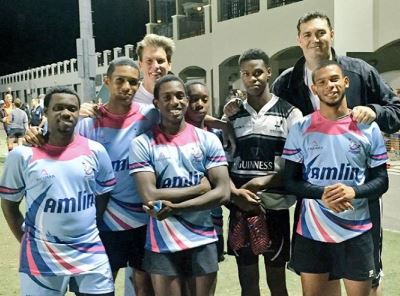JBL Uses Rugby to Help Bermuda’s Kids
By Caleb Smith, SLAM! Wrestling
Most people just complain about trouble in their community or simply look the other way and hope the problem goes away. When former WWE champion John “JBL” Layfield saw social problems in the form of youth violence in his locality he decided to help make a change.
In 2009, as Layfield’s storied wrestling career started to wind down he moved to the island of Bermuda with his wife. While the island is idyllic, he noticed a disturbing trend in the local paper. It seemed that every day there were stories about young people acting out in violent ways against one another.
He wanted to do something to help these kids have a better purpose for their lives but he wasn’t sure where to start. The pieces of the puzzle he was trying to solve started to fit together when he attended the 2010 FIFA World Cup of soccer in South Africa.
“I went to the soccer World Cup in 2010 in at met with Nick Keller of Beyond Sport,” said Layfield. “We were at the bar one night and he invited me to one of these shanty towns where he was working with these kids. We went to this large shanty town outside of Cape Town, which is the biggest in the world, and I fell in love with the idea of using sport to change kids’ lives.”
“When I was staying in Bermuda I was seeing so much about violence and gangs that I decided I wanted to do something to help those kids. I started looking around for a sport. It was just in the newspapers everyday about youth violence and gang violence, drugs, and I just wanted to do something.”
By seeing the impact that sport and positive mentors had on the disadvantaged youth of Cape Town, Layfield was inspired and determined to find something athletic that would help kids in Bermuda. Very soon he found a sport that was foreign to him as a former American football player, but represented the ideals of community, teamwork and goal setting — rugby.
“I love the ethos of rugby, the principles of rugby, the integrity of rugby,” recalled Layfield. “I think all of that makes it a completely unique sport and I thought it was perfect to work with our kids. With a sport like that there is contact and they didn’t have any contact, rugby was perfect for them. You don’t need 22 players and all the equipment, you just need a ball, some green grass and some kids who want to play. So, it was the perfect sport for us and that is how I got into rugby.”
Read more of the article here.
